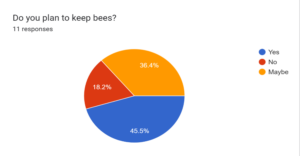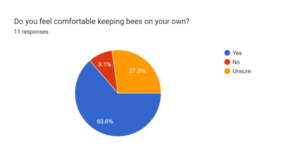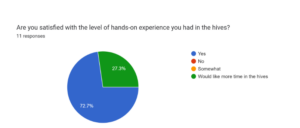Final report for EDS22-34
Project Information
Project Abstract
The Community Apiary educated an urban community on beekeeping. This two-year project combined the work of beekeepers and urban farmers to increase community awareness of the potential for beekeeping and the sale of the honey as a source of income.
The project explored a community-driven model for sustainable beekeeping education. Located in the historically Black neighborhood of Moncrief Springs in Northwest Jacksonville, White Harvest Farms is a 10.5-acre urban no-till regenerative farm that operates a farmer’s market on-site, and hosts a variety of workshops including organic gardening, herbal teas and edible weeds, composting, and the art of beekeeping. WHF is operated by the Clara White Mission, a non-profit established in 1904 to aid in feeding the homeless, housing veterans and training community members for jobs. The land cultivated as WHF was once inhabited by the mission's founder and is historically significant in the Black community. Furthermore, WHF’s weekly farmers market supports regional farmers through acceptance of EBT while doubling EBT purchases on Florida-grown produce through the Florida Fresh Access Bucks program. The Community Apiary provides additional opportunities to expand local food production, diversify our local food economy, and provide exposure to underserved community members to entrepreneurship opportunities and careers as an apiary worker.
The Community Apiary is supervised by The Herban Bee, which maintains 15 existing hives situated at WHF. This program expanded our the hives from 15 to 25 hives during the 2 years this grant program was operating. The beekeeping internship educated beginners on all aspects of beekeeping from securing local permits, purchasing equipment and processing honey. The Beekeeping curriculum involves formal classroom as well as hands-on education for three hours twice a month from the spring to fall. The project is a collaboration between farmers and beekeepers to manage nectar sources and crop pests sustainably for production of high-quality produce and high honey yield while growing locally adapted bee populations.
The Community Apiary addresses the environmental barriers to sustainable beekeeping such as organic pesticide use on farms and contaminated nectar sources by educating farmers and beekeepers on pollinator crop management strategies and integrated pest management strategies. It addresses social and economic barriers to beekeeping by providing the program to residents in the 32209 ZIP Code where many residents are low-income and there is unequal access to healthy food. The project gives aspiring beekeeping entrepreneurs the opportunity to increase and diversify their income sources.
In disadvantaged communities there is often a disconnect between food source and food acquisition. Beekeeping gives communities an opportunity to connect a food with a food source, creating a pathway of thinking about healthier food options and choices. Honey as a food source is rich in bioactive plant compounds and antioxidants and can reduce pollen-based allergies.
Over the two-year grant period, the project partners will work together to build and refine a regionally adapted Beekeeping Curriculum and Pollinator Crop Management strategy. This information will be shared with interns enrolled in this program as well as those enrolled in WHF sustainable farming curriculum, funded separately.
Objectives
- Establish a Community Apiary at a public, nonprofit farm, White Harvest Farms (WHF) in Jacksonville, Florida
- Create a Community Apiary Beekeeping Curriculum and Pollinator Crop Management plan for educational use in the Northeast Florida region (NEFL)
- Engage at least 20 participants as beekeeping interns for each year of the two-year project and use WHF programs to educate about Integrative Pest Management and growing cover crops for beneficial insects and bees
- Use multiple outlets to share the Community Apiary Curriculum and Pollinator Crop Management Plan
This project utilizes the outdoor classroom at White Harvest Farms to set up an additional line of sustainability education on the topic of beekeeping and pollinator education. It establishes a Community Apiary with at least 20 hives for an experiential learning initiative. The Community Apiary will be managed by local beekeeper Mika Hardison, co-owner of The Herban Bee, who will educate participants on beekeeping as a sustainable entrepreneurial pursuit.
The Herban Bee will create an updated training curriculum that includes the basics of establishing a beehive, including:
- building a beehive
- maintaining a beehive
- treating pests and disease
- splitting hives
- processing honey
- making honey products
- marketing honey (see attachment for more details on the curriculum)
This culturally accessible training will engage students in hands-on and classroom learning on all aspects of becoming a successful beekeeper. It will include additional resources for learning and how to continue beekeeping after the internship ends. The Herban Bee and WHF will engage at least 20 individuals annually for a total of 40 for the life of the project as students of the Beekeeping Internship at the Community Apiary.
White Harvest Farms staff will use USDA/SARE resources to create a pollinator crop management plan that provides habitat and nectar for beneficial insects and bees throughout the year in the NEFL climate. WHF staff will implement the plan using their crop rotation techniques and IPM buffer areas to have a consistent source of flowering beneficial plants at the farm. WHF will utilize cover crops as a primary source of pollinator crops, as they are affordable, easy to establish, increase pollinators and beneficial insects, and build soil.
WHF hosts tours with local groups including Duval Soil and Water Conservation District - Start Farming, Wealth Watchers, Edward Waters College New-Town Success Zone Community Garden, and Master Gardeners. Additionally, WHF staff share an Introduction to Organic Gardening class every month. During tours and classes like these, WHF staff educate participants on the benefits of IPM and steps to implement it on a small farm or garden. WHF will purchase seed for IPM plantings and create regional educational materials around IPM and pollinator crop management.
Additionally, WHF staff will use multiple channels to distribute the Community Apiary and Pollinator Crop Management Curriculum to the public. Staff will share the Community Apiary and Pollinator Crop Management curriculum digitally, on the Clara White Mission website. Staff will distribute the Community Apiary and Pollinator Crop Management as an e-book to local libraries and assist at least one library to make a display about the project during Pollinator Awareness Month (April). In the second year of the project, WHF and The Herban Bee will record lessons for inclusion in the e-book. Lastly, WHF and The Herban Bee staff will attend at least one national, state, or regional conference to share the Community Apiary Project with the public.
Cooperators
- - Producer
Education
In 2022 the Community Apiary enrolled 20 beginning beekeepers for participation in monthly beekeeping instruction at WHF. The participants performed an entrance survey at the beginning of the internship to gauge their knowledge and skills level. The interns participated in a weekly, optional mentorship offering on Wednesdays with Mika Hardison of the Herban Bee. The internship takes place during the honey flow in zone 9a NE FL which is February – September. The internship is designed to take beginning beekeepers through the beekeeping season from setting up new hives, to making splits and harvesting honey. In 2022 the Community Apiary Internship cohort met once per month on Saturday and Sunday for formal instruction and hand-on opportunities in the beehives. The Sunday offering had reduced attendance through the grant and this was changed in the following cohort. Upon graduation from the internship, the participants completed an exit survey which evaluates what they learned, attendance and gathers feedback from the interns. In 2022 we had 13 interns graduate from the internship. However we did not have great involvement with the exit survey, only 7 individuals completed the exit survey after several follow up attempts after graduation.
In 2023 we enrolled 23 interns in the Community Apiary Program. The internship meets monthly for instruction on Saturday which is the hands-on offering and on Wednesday evening for classroom instruction that is also offered via zoom. The Wednesday and Saturday sessions are being well attended so far in 2023. We also started the internship earlier this year, in February, so that we had time to introduce core concepts and order materials before the beekeeping season really got started. Additionally, the optional Wednesday mentorship is being offered by the Herban Bee. Additionally, year one beekeeping graduate, Nicole Boone, assist Mika and helps perform hive maintenance and offers mentorship to the 2023 cohort of students. The second bee keeping graduation was held on Sept 23, 2023, for a total of 15 students. Many students dropped out in year 2 for a variety of reasons. 5 individuals left the program without notice and without follow up. We were unsuccessful in engaging them after they have left the program. 2 individuals left the beekeeping internship due to transportation issues, and 1 individual left because they were not satisfied with the program. 7 students filled out the exit survey. Entry _ exit Survey 2022 _ 2023 beekeeping (Responses)
Notable Survey Response Charts
Beekeeping operations had a slow start in the spring of 2022. We received notification of the award in the early part of 2022 but it wasn’t until July 2022 that funding was fully available for purchase of equipment and supplies. For this reason, actual beekeeping operations were limited to the existing hives The Herban Bee already had situated at WHF. We decided to go ahead with the internship in April 2022 despite being limited on funds to purchase additional materials and supplies. For this reason the 2022 cohort was not able to share in a collective honey harvest and each student took home 2 quarts of honey. In March of 2023 the necessary supplies, nukes (starter bee hives) and equipment were purchased and ready to employ with the 2023 cohort. At this point in late April 2023 we have 14 hives situated on site for use for education related to the community apiary. Beekeeping operations are going smooth. Mika had some hive loss to varroa mite and moths in 2022. For the Spring of 2023 we started with fresh nukes and brand new equipment. With plenty of bee forage flowering and available on the farm, the hives are healthy and strong. With the addition of the funding we were able to purchase both Apivar and Apiguard that were instrumental in managing the varroa mite infestation. Additionally between the ending of the first and second years of the program we relocated the bees to from a shady area on the farm to a full sun location which dramatically impacted the health of the hives. The change in location positively impacted the hive health as well and the issues we previously had with both varroa mites as well as hive beetles were all but eliminated. An additional change we made to the hive management program was adding additional space to the hives that was not a part of the honey harvest. Beginning in 2023 we began adding additional super boxes on the brood chambers as the standard space given to the bees. We add our queen excluders on top of the deep and medium boxes, it is our belief that this is beneficial in urban areas where maximizing space is a critical part of managing hives. The result was stronger hives.
Furthermore, cover crop and bee forage research was performed at one farm in Jacksonville, FL – White Harvest Farms. The wild flower areas were established at White Harvest Farms in order to provide increased forage to the bees at WHF. A 300 foot long by 5 foot wide wildflower forage zone was established in December of 2022 along a sunny south facing edge of White Harvest Farm. In January of 2023 a 90 food by 7 foot wide area was also established on the edge along the WHF Community Garden. Both of these areas as flowering in April of 2023. There was some weed intrusion of rag weed and thistle which were counter productive to some of the wildflowers planted. Bee keeping interns helped removed the rag weed and thistle from the forage yard, learning about bee forage maintenance and control populations to ensure the most diversity of crops. In winter 2023, the area was mowed low to the ground and an additional 10 lbs of wildflower seed was disbursed in the area. In early spring 2024, there were many species germinated and in bloom. An additional area 10x50ft was established through tilling and sowing 2 lbs of wildflower mix and cover crop seed. This area is dry and sandy, so additional compost and mulch was added to help ensure germination and make sure plants receive enough nutrients and water to mature successfully.
Cover cropping is a practice that is well established at White Harvest Farms. Through the course of the grant there has always been at least one of the farm plots in cover crop. There is plot 4 which is about 100 feet by 70 feet which has been planted in a rotation of sunflowers, buckwheat, winter triticale, clover, oats, sorghum, sunnhemp, chicory, crimson clover, white cloud clover, Austrian winter pea and vetch. Cover crop was rotationally planted in plot 4, planted in May 2022 and November 2022. Additionally plot 2 which is 100 feet by 80 feet was planted with a cover crop of sun flowers, winter triticale, buckwheat, clover and sorghum in September 2022. The cover crop is routinely allowed to mature and then is mowed to make compost. The cover crop is moved with a push mower on a high setting and a bagger attached to easily collect the trimmings. Depending on the crop and time of year the cover crop is allowed to recover and regrow after being mowed. This was demonstrated when a winter crop of winter triticale, daikon radish, oats, Austrian winter pea, crimson clover, chicory, white clover, and buckwheat was planted on 11/9/2022 and moved on 2/8/2023. It was mostly Austrian winter pea and winter triticale that provided the majority of biomass at this time. In April 2023 the clover, radish, and winter pea are actively blooming. This finding saves farmers money on cover crop seed and allows them to mow the crop for compost production while suppressing weeds and still getting the most out of their investment in seed. In summer 2023, 2 of 3 plots where fully in cover with sunnhemp, sunflowers, rye grass, sorghum, buckwheat. Additional permanent covers were established amongst fruit orchards to provide additional bee forage. Bee interns toured and learned about the benefits of cover crop for forage, highlighting the affordability and ease of growing. Bee interns were showed how to maintain cover crops--establishing, mowing, watering, dead heading, crop rotation etc.
Perennial plants were also established along the perimeter of the bee yard. These plans include- coral honey suckle, jasmine, passion vine, blue butterfly pea.
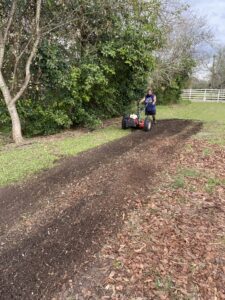
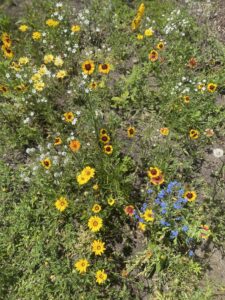
The educational materials for the Community Apiary Internship were crafted by Mika Hardison Carr of the Herban Bee. She gathered these resources from local and state agencies who provide resources and worksheets that align with the program curriculum. These educational materials are attached at the end of this report.
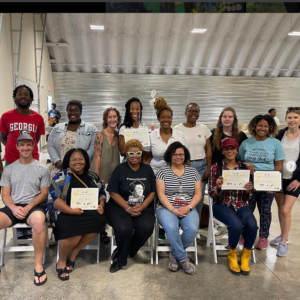
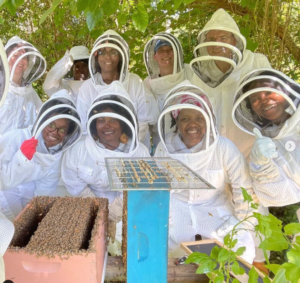
Department of Entomology and Nematology
University of Florida taught a session of beekeeping with students
Educational & Outreach Activities
Participation Summary:
Educational and outreach activities related to the Community Apiary have been performed since March 2022 until present. The numbers cited above correlate the participation in White Harvest Farms Community Apiary from March 2022 until present. The activities in the apiary are limited to 20 interns per session. There is an attached spread sheet which references the on farm demonstrations, topics and attendance. Bee Internship data
The Herban Bee provided an online class on March 24, 2022 which encouraged participants interested in the apiary to meet her and get more information on the internship. Our 2022 internship cohort was full at 20 individuals at the beginning of the session. Hands-on mentoring is offered once weekly on Wednesdays by the Herban Bee throughout the grant period. Educational weekends are offered on a monthly basis while the internship is in session, 7 months of the year. In 2022, the educational weekends are on Saturday from 10-2 and on Sunday from 12-4. In 2023, the cohort meets once a month on Saturday and from 6-8 pm on Wednesdays once a month Community Apiary Schedule 2023. The educational sessions combine classroom presentations with hands-on on farm demonstrations and time spent in the hives on the farm. Additionally, WHF staff gave the Community Apiary interns a tour of the farm, a presentation on the overview of sustainable agriculture and an on farm demonstration on sowing cover crops and pollinator crops in NE FL Beekeeping Internship Brochure.
During 2022 and 2023 cohort Mika Hardison Carr led a value added workshop for the community apiary interns on soap making, elderberry syrup, and honey infusions. Amy Vu, State Specialized Program Extension Agent - Apiary, Honey Bee Research and Extension Laboratory, Department of Entomology and Nematology, University of Florida came and taught 2 classes- one for cohort 2022 and 2023.
During the honey extraction the process the students learned when to extract honey as well as how to measure the amount of moisture in the honey with a refractometer. This was important to ensure the honey does not ferment and become unusable. Additionally the students had the opportunity to compare authentic honey with honey's purchased from local discount stores to determine authenticity. Students also were taught the value that honey adds to products. Adding honey to soap, lotions, etc is a way to maximize profits while using minimum amounts of honey. This skill is particularly useful in urban area where honey yields may be smaller due to space constraints. In the soap making class students were taught how to utilize the bee forage in products as well. The soap made in the class included calendula as an extra ingredient to increase the value of the soap. projects.sare.org/…/-at projects.sare.org/…/Students-at-harvest.movprojects.sare.org/…uploads/IMG_2530-_3028 (1)MIKA ADD CONTENT
Furthermore, Mika Har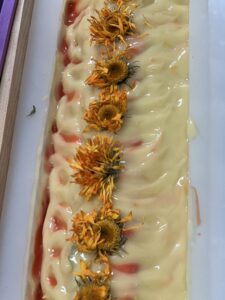 dison-Carr and WHF staff offer on farm demonstrations, volunteering and outreach on a regular basis. WHF offers volunteer opportunities on the 10 acre urban farm three days a week. Tours are frequently offered by request. In 2022 and 2023 WHF staff engaged 1,012 volunteers in 4336 hours of volunteer labor on the farm and engaged 711 visitors to on farm events and tours. Outreach of this manner is harder to correlate directly to the Community Apiary program but certainly offers an opportunity to discuss beekeeping, pollinators and sustainable agriculture. In 2023, we promoted a free honey tasting via email and social media to encourage folks to visit the farm and learn more about the community apiary February Newsletter 2023 - Honey tasting. Additionally, we have held beekeeping immersions , information sessions and and several workshops for beekeeping.
dison-Carr and WHF staff offer on farm demonstrations, volunteering and outreach on a regular basis. WHF offers volunteer opportunities on the 10 acre urban farm three days a week. Tours are frequently offered by request. In 2022 and 2023 WHF staff engaged 1,012 volunteers in 4336 hours of volunteer labor on the farm and engaged 711 visitors to on farm events and tours. Outreach of this manner is harder to correlate directly to the Community Apiary program but certainly offers an opportunity to discuss beekeeping, pollinators and sustainable agriculture. In 2023, we promoted a free honey tasting via email and social media to encourage folks to visit the farm and learn more about the community apiary February Newsletter 2023 - Honey tasting. Additionally, we have held beekeeping immersions , information sessions and and several workshops for beekeeping.
There have been two unique informational resources that have been created as a result of this grant. A information sheet on wildflower species, resources and bloom window in NE FL is in process. The informational sheet on bee forage was created by WHF staff Bee Forage Guide. Additionally a beekeeping curriculum has been created by Mika Hardison-Carr Beekeeping Cirriculum.
We sent out several email correspondences related to the Community Apiary programs in February 2022, October 2022, and February 2023 promoting the Community Apiary programming Newsletter - Feb 2022 Newsletter - October 2023 Community Apiary Update. We were also featured in two published news articles which can be accessed below.
In 2022 the Community Apiary Internship was featured on First Coast News – a segment called The Buzz which promoted the Community Apiary Internship at White Harvest Farms. https://www.firstcoastnews.com/article/features/trending-today/learn-ropes-beekeeping-white-harvest-farms/77-a8c62c1c-37f6-41b8-ab68-16550c8fb23c
In the fall of 2022, we were featured again on First Coast news promoting the Community Apiary internship. https://www.firstcoastnews.com/video/entertainment/television/programs/gmj/learn-more-about-locally-grown-healthy-food-beekeeping-with-gmj/77-c7e93c5e-2168-456a-a5c1-4cd0190de892
Learning Outcomes
Sustainable agriculture
Pollination
Biodiversity
Native Bees and pollinators
Honey Bee Anatomy
Honey bee culture, cast system, developmental timeframes and temporal polytheism
Bee keeping equipment
Local beekeeping rules and regulations
Swarm behavior, reduction and capturing
Honey bee viruses, disease, pest, environmental threats (and the management of)
Preparing land for planting pollinator forage and cover crops
Honey extract, storage and the making of value-added products
Making hive splits and nucs
Project Outcomes
Beekeeping Student GuideThe participants in this program learned the skill of beekeeping from Mika Hardison-Carr of the Herban Bee. She covered a wide range of topics related to beekeeping and sustainable agriculture with a group of mostly beginning beekeepers and farmers. She covered these topics with dynamic in person instruction in a classroom setting and with hands on experiences in the bee hives. The topics covered were the Impact of bees on the world and the economy, native bees, biodiversity, honey bee anatomy, Getting started in Beekeeping, Keeping Bees in FL, equipment, swarms, making splits and nucs, diseases and pathogens, pest management, inspections and maintenance, pollen and nectar sources, and honey products and processing. The students received instructional materials that explained core concepts that were reinforced with hands on activities in the apiary. Participants in both sessions received a lesson from guest speaker, Amy Vu, from UF/ IFAS entomology lab. Additionally, the White Harvest Farms and The Herban Bee Instagram and social media pages were used to share the concepts of urban bee keeping, food sovereignty, biodiversity and sustainability. WHF is a demonstration for students and visitors for bioprojects.sare.org/…/Beekeeping-Student-Guide.pdfdiversity, cover crops and bee forage and nectar production. Since starting the SARE grant there has always been areas in cover crop or bee forage. Staff record wildflower species used, seed source and bloom window in zone 9a NEFL Bee Forage Crops.
To date the White Harvest Farms Community Apiary has engaged 64 new and beginning farmers and beekeepers. We have graduated 28 interns from our urban beekeeping program in 2022 and 2023. This project effects and exposes new and beginning farmers and beekeepers to urban regenerative agriculture and urban beekeeping in Jacksonville FL. The farm impacts the surrounding community by exposing guests, visitors and participants of the internship to culturally appropriate education and mentorship in agriculture and beekeeping. Mika Hardison Carr of the Herban Bee is a passionate spokesperson for food sovereignty and exposing the urban population to careers in beekeeping and as an apiarist. This program supports and promotes a growing trend of black farmeprojects.sare.org/…/Beekeeping-Student-Guide.pdfrs in urban agriculture Community Apiary.
To track project outcomes, we performed an entrance survey of the participants. We asked about participants existing knowledge of beekeeping and cover crops, sustainable agriculture, native bees, equipment, and regulations. 62% of participants had no experience beekeeping. 43% of participants had experience keeping a vegetable garden but only 6.5 % were familiar with planting cover crops. 56% of participants had space to keep bees or a garden. 9.7% of participants lived in a condo or apartment and 38% lived on less than ¼ acre. Most participants ranked themselves as level-1 (or no knowledge) on a scale of 1-5 of honeybee anatomy, honeybee culture / caste, beekeeping equipment, regulations, swarm reduction, disease prevention, honey extraction and making splits. entry survey 2022-2023
Upon graduation we performed an exit survey which tracked attendance, progress and learning outcomes. 85% of participants attended all the sessions. 100% got hands-on experience in the beehives. However, 28% said they would have liked to have more experience in beehives. That was our biggest piece of feedback after graduation, that the graduates would have liked to have more time in the beehives. 71% of graduates feel comfortable keeping bees on their own after the internship. However only 28% of graduates planned to keep bees after graduating. 42.9% of graduates would like to keep bees at the White Harvest Farms Community Apiary after graduation. The majority of participants ranked themselves as number-3 on a scale of 1-5 in their knowledge of honeybee anatomy, honeybee culture / caste, beekeeping equipment, regulations, swarm reduction, disease prevention, honey extraction and making splits. 100% of respondents were very satisfied with Mika Hardison-Carr’s instruction and with their overall experience with the Community Apiary. Exit Survey 2022
2023 Beekeeping Payment and Scholarship
2022-Cohort-income-expense-statement.pdf
2022 Cohort - Beekeeping intern demographics
